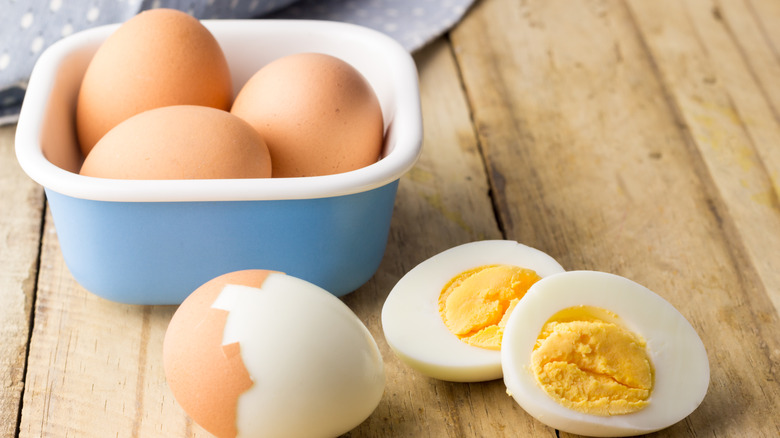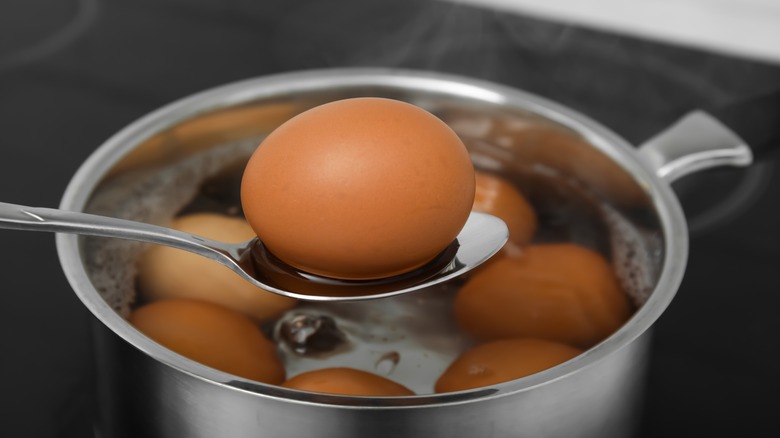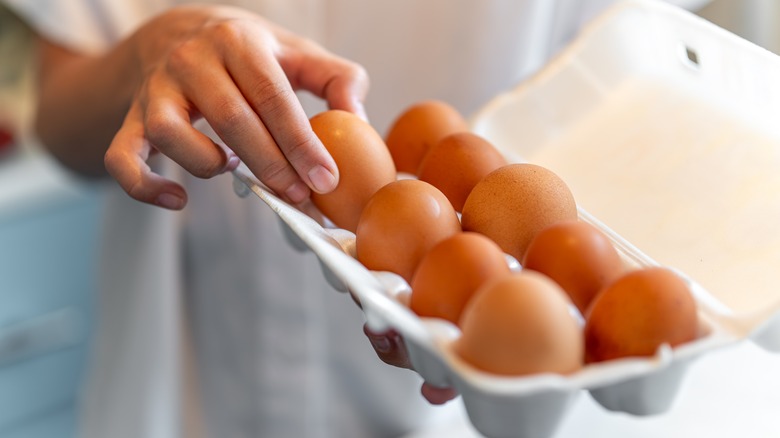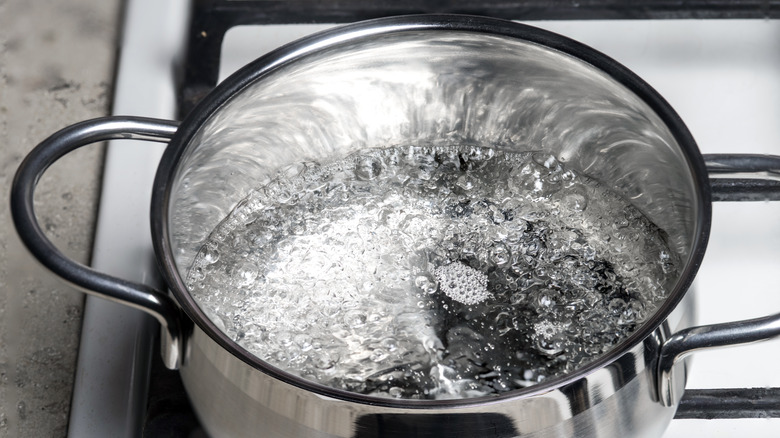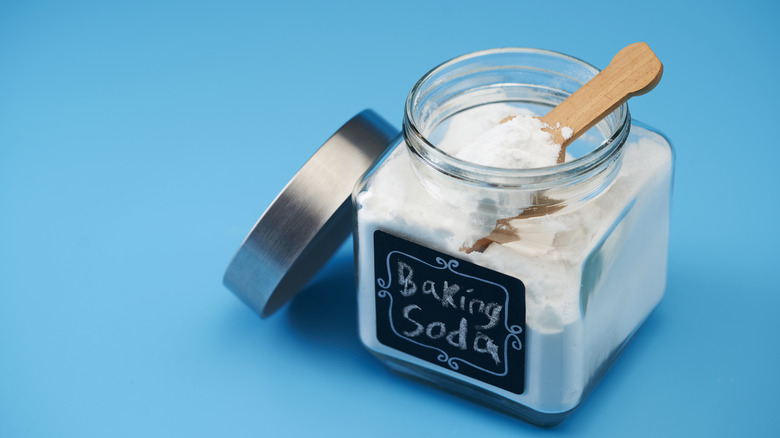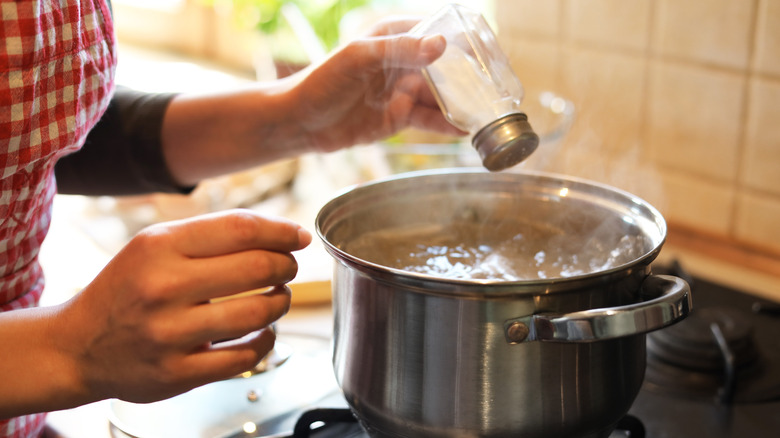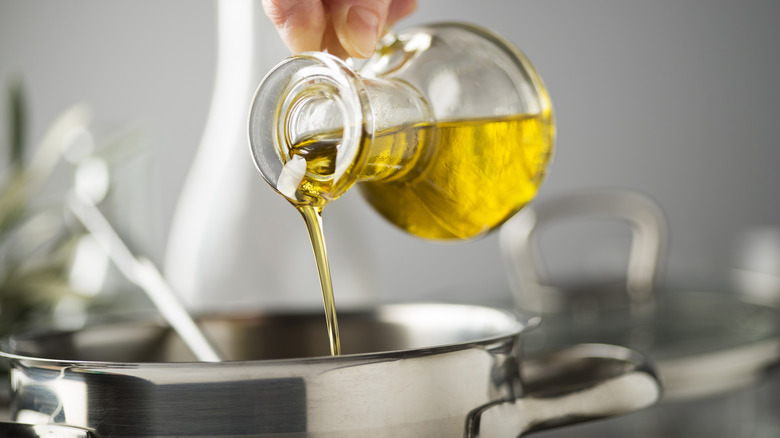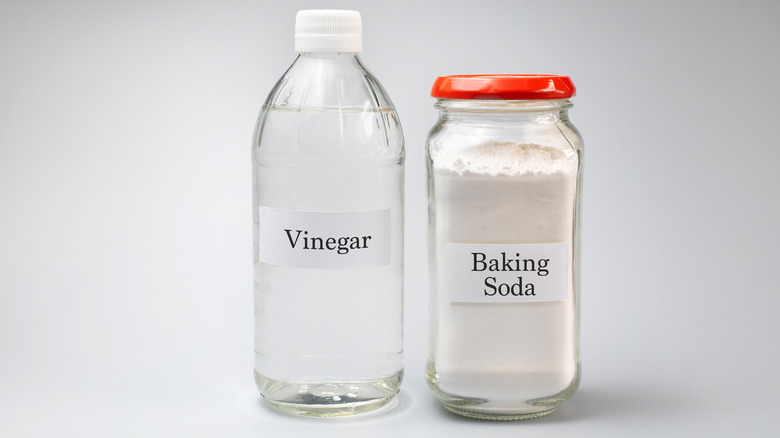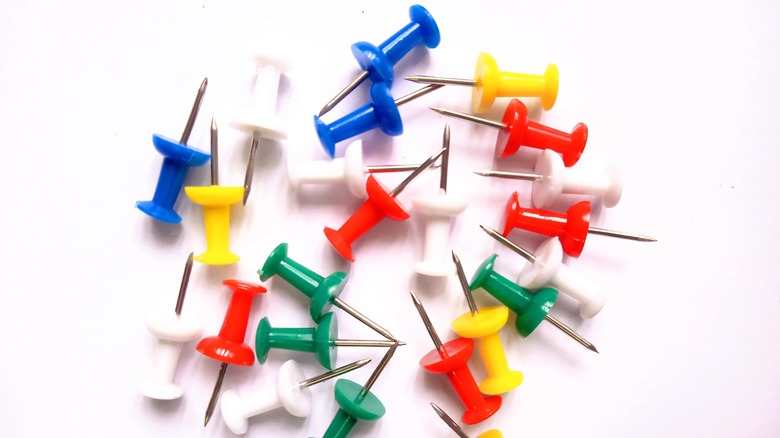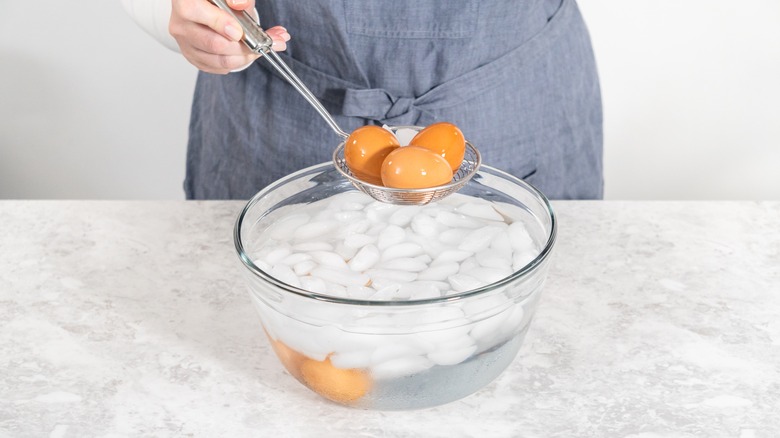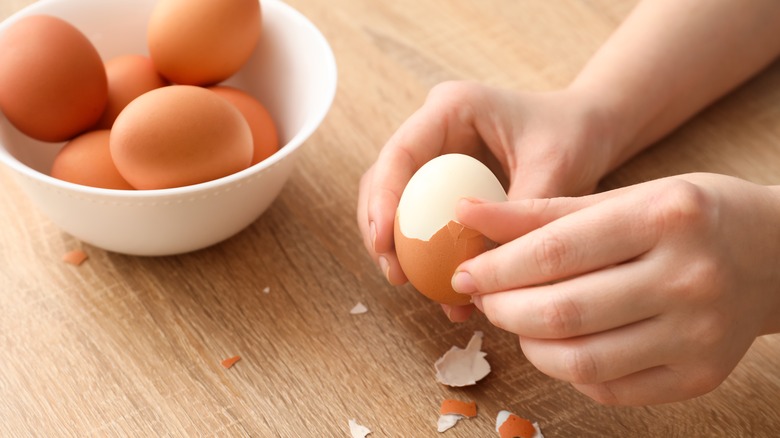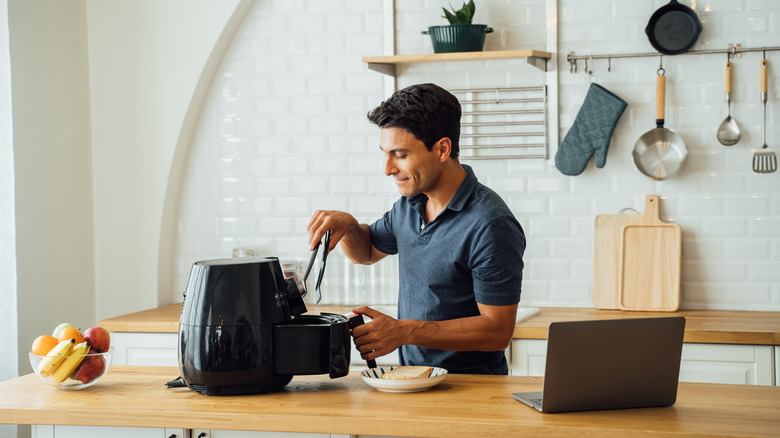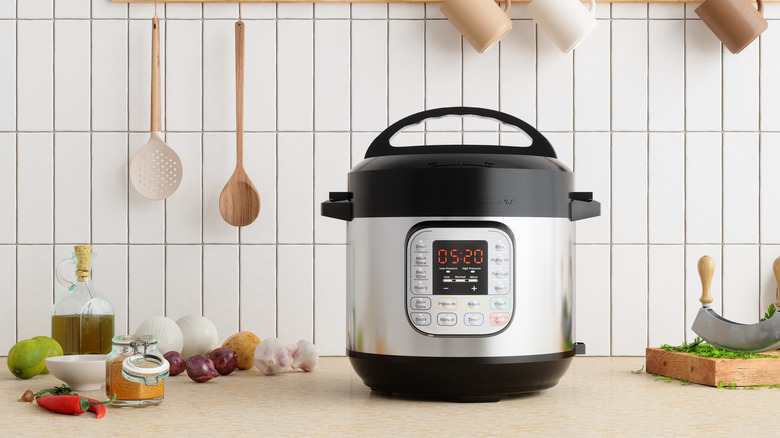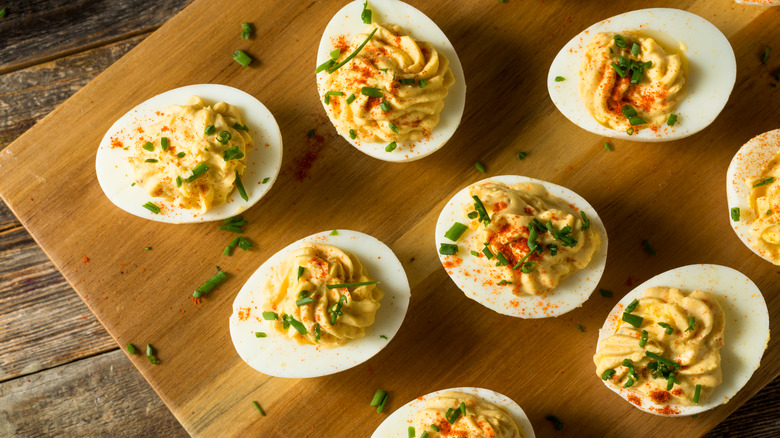The Absolute Best Boiled Egg Hacks According To 6 Experts
Breakfast has evolved quite a bit over the years, from jellied meats and breakfast casseroles — even meatloaf was once a breakfast food – to boxed cereals, matcha lattes, and blueberry muffins. One ingredient, however, that has stood the test of time, popping up again and again on our breakfast plates, is the humble egg. Whether poached, fried, whipped into a silky omelet, or scrambled, eggs are versatile and nutritionally dense. Still, few recipes are as iconic or seemingly simple as the boiled egg.
While famous as a breakfast food, boiled eggs are also great additions to other meals. You can serve them in ramen, alongside curry dishes, or dress a salad with them for some extra protein. Getting a boiled egg right requires a surprising amount of precision, especially if you like your eggs at that sweet spot between soft-boiled and cooked through. To find out if there are any hacks you can use to improve your egg-cooking skills, we spoke to 6 experts to discover the secrets of a perfectly boiled egg.
1. Boiling eggs is all about the timing
Precise timing is essential when it comes to boiled eggs. Just a few minutes can mean the difference between eggs with a jammy, soft yolk and eggs that are overcooked and rubbery. Cookbook author and recipe developer at The Infinite Feast, Brian Theis, notes that he likes "a 7-minute soft-boiled egg if [he's] having one in an egg cup for breakfast — [it's] less runny, easier to scoop with a spoon. When making a hard-boiled egg for a salad or for deviled eggs [he] boils them for about 12 minutes, sometimes a little longer."
The easiest way to get your timings right is to set a timer and have it ready to go before you begin cooking. Size is also important as smaller eggs take less time to harden, whereas larger eggs have a longer cooking time. Most egg boiling times refer to a standard shop-bought large egg that weighs around 2 ounces — this is what most recipes mean when they ask for a large egg – so if you're cooking with smaller eggs, you should stay on the lower end of any timing recommendations.
2. Use slightly older eggs
Cooking with eggs can be a slippery business. While one of the most common mistakes you're probably making when poaching eggs is using eggs that are too old, another common egg boiling mistake is using eggs that are too fresh. Maya Krampf, founder, recipe developer, and food blogger at Wholesome Yum, explains that fresh eggs contain less acid, meaning the egg white clings to the inner shell more. She adds that "with older eggs, the shell absorbs more air, becomes more acidic, and also shrinks slightly. All of these aspects create more space between the shell membrane (that covers the egg white) and the shell itself [and] means easy peel hard-boiled eggs."
Although raw eggs can keep for up to five weeks in the fridge, it's still important to check the freshness of your eggs if they've been hanging around the kitchen for a while. Unlike other cooking methods, where you can crack your eggs into a bowl first to see how they look or smell, boiling cooks eggs in the shell, meaning you'll need to get a bit more creative. One method you can use is the water test — where you place an egg in water to see if it sinks or floats. An egg that sinks is super fresh, an egg that floats is quite possibly too old to eat, and an egg that bobs upright is probably the right age for hard-boiling.
3. Start your eggs in hot water
Starting your boiled eggs in cold water has a couple of advantages. One: It's a bit easier to place your eggs in a pan and pour cold water over them than to gingerly drop them into boiling water and end up scalding yourself or cracking the eggs on the pan base. Two: Eggs can sometimes crack when the temperature changes rapidly, leading to spillage from the shell into the water.
However, Nelson Serrano-Bahri, professional chef and director of innovation at the American Egg Board, favors a hot start. He notes that "starting with boiling water instead of cold can [...] make peeling easier" as the rapid temperature shift causes amino acid proteins within the egg white to stiffen and coagulate, pulling away from the shell.
Another area where a hot start has an edge is in the timing. Dropping your eggs into a pan of hot water lets you to know the exact moment at which they start to boil. To avoid breaking the shells, ensure that your water isn't boiling too hard — you don't want the eggs to knock together or hit the sides of the pan — and use a slotted spoon to lower them carefully in.
4. Whip out the baking soda for easy-peeling boiled eggs
If picking sharp bits of shell off your hard-boiled eggs makes you want to hang up your apron, try sprinkling a bit of baking soda into your water. Jessica Chan, former chef and food blogger at Jecca Chantilly, explains that "baking soda increases the alkalinity of the boiling water which can make the eggs easier to peel. The presence of alkaline in the boiling water causes an increase in the pH levels which can help loosen the egg whites from the shell."
Adding baking soda not only increases the water's pH but also that of the egg, which reduces any clinginess in the white and makes it less likely you'll gouge chunks off your egg when trying to remove the shell. You'll only need about a teaspoon of baking soda to make this hack effective and you can add it to your water once it's at a boil.
5. Add some salt to your water
According to Nelson Serrano-Bahri, "adding salt to the water when boiling eggs can help with the coagulation of the egg white if the shell cracks during cooking." Serrano-Bahri explains that salt helps to speed up the egg's solidification process, limiting the spillage if your eggshell breaks and potentially saving your hard-boiled eggs from becoming a misshapen mess. Salting your egg water can also impart a light, briny flavor to your eggs as eggshells are porous and absorb flavors from the environment.
If you want to add extra flavor to your boiled eggs or prepare them to serve in ramen, you can boil them in broth or stock to help them take in umami flavors. Alternatively, you can marinate eggs once they are hard-boiled and peeled – soy-marinated eggs are the topping your ramen has been missing – and can be made using a mixture of mirin and soy sauce. Additional seasonings, like ginger or star anise, can give your ramen eggs a nice kick.
6. Use a splash of oil to cook your eggs
Another way to make the most of your eggs' porous qualities, is to pour some oil into your cooking water. Like other liquids, oil can permeate the shell of your eggs and, according to Nelson Serrano-Bahri, can "create a thin film on the eggshells, which may help in preventing the shells from sticking to the egg white." However, Serrano-Bahri also warns that putting oil in the water can make your eggs feel slightly greasy or slippery, which can be offputting to some diners.
If you're unsure about this, it's best to use a small splash of oil – up to a tablespoon – to avoid making the water too greasy. You can use any oil but, since the eggs can subtly take on the taste if cooked for a long time, make sure you choose one that you enjoy the flavor of. Nelson Serrano-Bahri also notes that leaving the oil out doesn't change or affect the cooking process, so don't feel bad if you forget or want to try boiling eggs without water.
7. Adopt the vinegar method for easy peeling
If you don't want to add oil to your eggs but you do want some help with peeling, using vinegar is another helpful hack. Maya Krampf clarifies that "vinegar helps with peeling [...] because it softens the shell, [and that] white vinegar or apple cider vinegar both work" for this. Acetic acid in the vinegar gradually dissolves calcium bicarbonate – a crucial chemical component of an egg's outer shell. Amazingly, if you steep a raw egg in pure vinegar, the shell will completely break down — it's a fun kitchen science experiment to put to the test.
Krampf explains that once the shell is softened, it will become easier to peel off, leaving you with a perfectly smooth, hard-boiled egg. Similar to adding salt to your water, vinegar can also help repair damage if your eggshell cracks while cooking by rapidly solidifying the whites. Adding around 2 teaspoons of your chosen vinegar for every cup of water is a good way to gauge the quantities.
8. Pierce your eggshells with a thumbtack before cooking
Unusual as it sounds, this tip comes highly recommended by Nelson Serrano-Bahri, who notes that it does in fact make boiled eggs easier to peel. Making a small hole in your eggshell with a pin or a thumbtack before boiling "allows some of the air inside the egg to escape during cooking, reducing the pressure that can cause the shell to crack. It can also create a small vent for steam, helping to separate the egg membrane from the shell."
This separation means the shell should be easy to draw away from the egg once it's finished cooking. If you use this trick, Serrano-Bahri suggests making the hole in the wider end of the egg as there is a natural air pocket. Piercing a hole there will let the most air escape leading to the best results.
When you want to peel your egg, you should be able to break the shell in this spot and find that it flakes away easily taking large chunks of the remaining shell with it. This is perfect if you want to peel a lot of eggs quickly for a family picnic or a meal-prepping session.
9. Shock your eggs after cooking
When cooling boiled eggs after cooking, you should aim to do it as quickly as possible. Grace Vallo, founder and food blogger at Tastefully Grace, recommends that you "immediately transfer [your] boiled eggs to an ice water bath after cooking. This shocks the eggs and helps the membrane contract, making peeling easier and keeping the yolk yellow (not green)."
Hard-boiled egg yolks turn green due to a chemical reaction between iron and sulfur compounds when the egg is overcooked. Plunging boiled eggs straight into an ice bath immediately halts the cooking process, meaning that the egg will only cook for the time you give it on the stove.
If you don't have any ice on hand, drain the eggs into a mesh strainer and run cold water over them for 1-2 minutes or until they feel lukewarm or cool to the touch. You can also reduce the cooking time by a minute or so and let the residual heat in the egg finish the job.
10. Crack the shell before peeling
Grace Vallo has a multi-step system for peeling boiled eggs. First, she recommends that you "gently crack the egg all over and roll it under your hand on a flat surface [as] this helps to loosen the shell, [then] begin peeling from the wider end." Vallo also recommends having a tap running while you peel your eggs so you can rinse bits of shell off under the stream.
You can crack your cooled-off eggs by placing them in a jar or a Tupperware container and gently shaking them so they rattle together or hit the sides of the tub. This should create many small cracks in the shell and loosen the membrane. Don't go overboard and shake too hard, as you don't want to smash up your eggs. You can also tap the eggs with your fingers or hit them against the side of your pot to create cracks and get you started.
Once your eggs are peeled, give them a thorough rinse under the tap to remove any stubborn shell pieces and gently shake them dry or pat them dry with a paper towel. Hard-boiled eggs last longer in the fridge than you might think so feel free to keep them chilled for up to one week.
11. Boil your eggs in the air fryer
Maya Krampf suggests making hard-boiled eggs in your air fryer if you don't fancy watching the stove or waiting for your eggs to cook. To do this, Krampf recommends "preheating the air fryer to 275 degrees Fahrenheit [and placing] the eggs in a single layer in the basket. For large eggs, 15-17 minutes is the ideal cooking time to make them hard-boiled." While this method may take slightly longer than boiling your eggs in water, it takes out much of the stress that comes from knowing exactly when your water hits the boil.
Krampf explains that, just like with eggs boiled in water, you will need to cool them quickly in an ice bath or under cold water when they're done, so don't put them in the air fryer and then forget about them. You can also make soft-boiled eggs in the air fryer by simply reducing the cooking time to around 9-11 minutes for a slightly moist, jammy yolk.
12. Cook your eggs in the instant pot
Another hands-off method for boiling eggs is to break out the instant pot. Similar to air fryers, instant pots can produce hard-boiled eggs without water, and the pre-set timer makes it easy to control your cooking times and helps you get consistent results. Jessica Anne Formicola, cookbook author, TV food judge, and recipe developer at Savory Experiments, likes to use the instant pot to make large batches of boiled eggs. She notes that this egg boiling hack "saves time not boiling water, [is] safer if you are cooking with kids — no stovetop or boiling water –, [and] always gets the perfect yolk center with exact cooking times for the size of egg you are making."
Cooking eggs in the Instant Pot essentially works by steaming them in a high-pressure environment, quickly solidifying the white and setting the yolk. To make instant pot eggs, you should add around a cup of water to your pot and place your eggs in the basket above this. Setting the timer at 3-4 minutes will give you gooey, soft-boiled yolks, while 10 minutes in the pressure cooker will fully hard-boil. Shocking your eggs in an ice bath will prevent any additional cooking time from residual heat.
13. Make boiled eggs in batches for crowd-pleasing spreads
Boiled eggs are super versatile are easy food to pre-prepare in batches due to their long shelf life. You can boil up a whole carton of eggs, store them in the fridge, and use them in multiple dishes throughout the week. Maya Krampf notes that boiled eggs "can be a great snack to take on the go by themselves or [can be] made into crowd favorites such as deviled eggs and egg salad."
To make egg salad, put your boiled eggs in a bowl with mayonnaise, mustard, and seasonings, like fresh chives and dill or just plain old salt and pepper. Mash the ingredients with a fork — or utilize one of the more unexpected ways you should be using your potato masher – until you get a chunky, creamy consistency that goes great in sandwiches.
For deviled eggs, hard-boil your eggs and then slice them longways. Scoop out the yolks — it's easier to do this if the yolk is slightly firmer — and place them in a separate dish. Stir mayonnaise, mustard, paprika, and Tabasco sauce into the yolks, then mix them with a hand blender until smooth. You can then pipe them back into the whites for a classic buffet spread.
